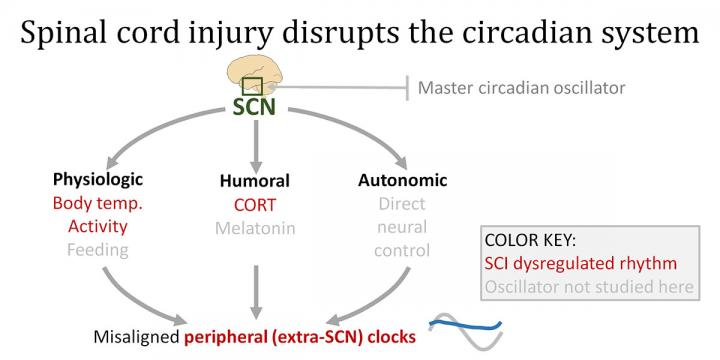
Credit: Image provided by Andrew Gaudet.
AUSTIN, Texas — Although paralysis is the most noticeable result of a spinal cord injury, a new study by researchers at The University of Texas at Austin suggests such injuries could throw off the internal clock of the entire body’s daily activities, from hormones to sleep-wake schedules.
The spinal cord helps transfer information between the body and brain, controlling functions such as movement, sensation and autonomic functions, but new findings, published in eNeuro, show it also plays a heavy hand in the circadian system — the body’s master clock that regulates the 24-hour rhythms of every cell in the body. Knowing this, researchers said, opens the door for early recovery tactics to preserve a patient’s overall well-being despite injury.
“These rhythms are crucial for health as the circadian system regulates many basic homeostatic functions in the body including activity, hormone rhythms and even metabolism,” said UT Austin pharmacy professor Laura Fonken, a co-author on the paper. “Disruptions of the circadian system are associated with pathological outcomes ranging from metabolic disorders to increased risk for certain types of cancer.”
To illustrate how the circadian system functions throughout the body, researchers offered this metaphor: The master circadian oscillator “clock” in the brain, which responds to light — specifically blue light — is the CEO of the body, sending information to key biological messengers, or middle managers, that interact with each other to inform cells, or workers, how to do their job.
In their study, researchers aimed to understand how moderate spinal cord injuries in rat models affect this flow of information, specifically regarding rhythms of hormones, core temperature, movement and immune genes far from the injury site.
“Previous research has focused on how spinal cord injury affects other parts of the body, but this is the first study to reveal the domino-like effect an injury might have on these rhythms that are crucial for health,” said lead author and UT Austin assistant professor of psychology Andrew Gaudet, who began this research at the University of Colorado Boulder.
Researchers found that circadian rhythms of hormones, body temperature and movement (together, circadian “middle managers”) were all disrupted by moderate spinal cord injuries, resulting in widespread disruption throughout the body. However, researchers remained optimistic, noting that identifying these disruptions could make way for new recovery efforts.
“If disruption of these rhythms harms recovery after spinal cord injury, efforts to restore a patient’s routines — for example, optimizing daily schedules of meals, sleep, physical rehabilitation and bright light — could promote recovery,” Gaudet said. “Future studies of spinal cord injury that incorporate circadian factors could inform the development of such ‘chronotherapies.’ “
###
In 2019, Gaudet’s research focus will shift to understanding the efficacy of these new strategies in reinstating the body’s natural rhythm — and whether this helps improve recovery after spinal cord injury.
Media Contact
Rachel Griess
[email protected]
970-405-3222
Original Source
https:/
Related Journal Article
http://dx.




